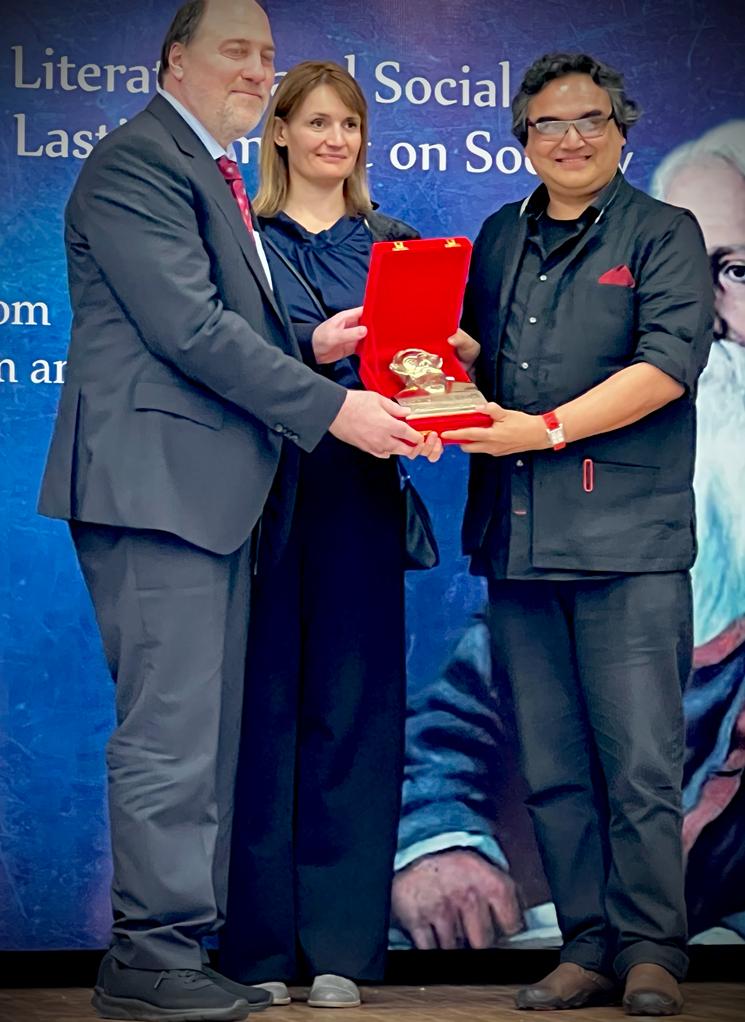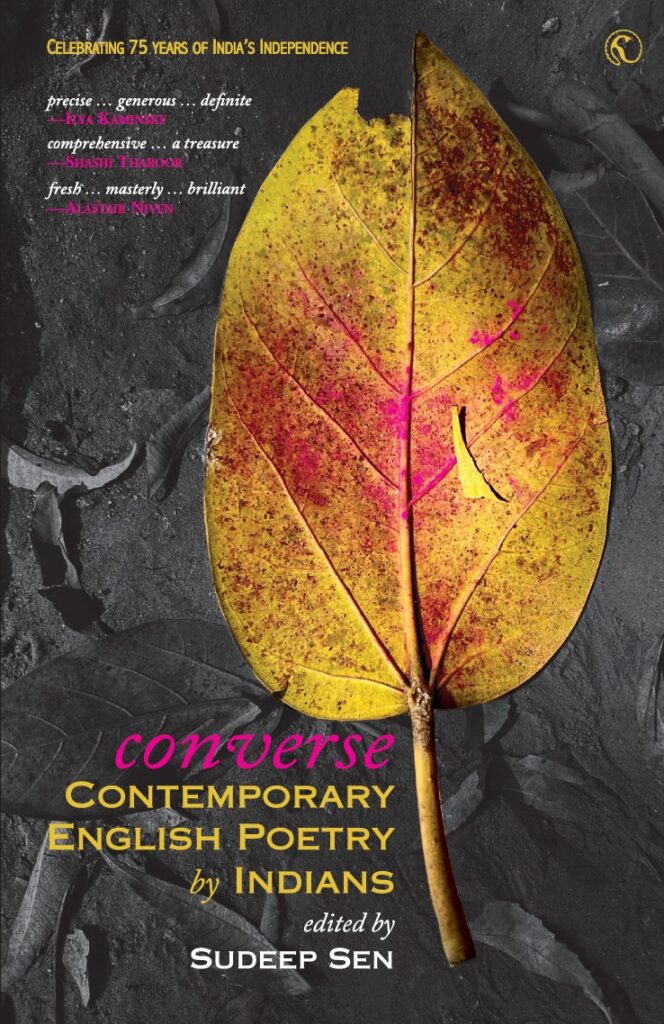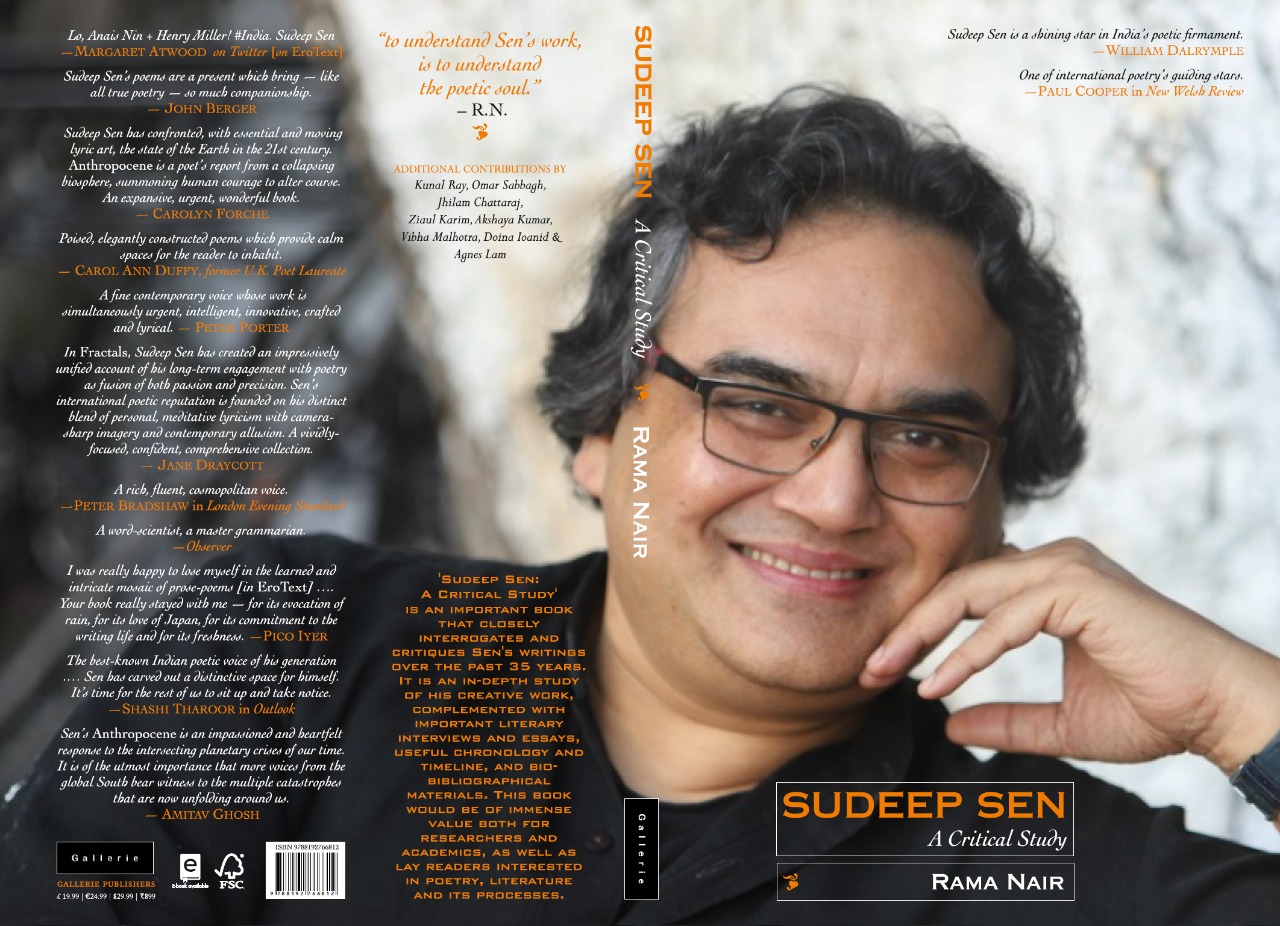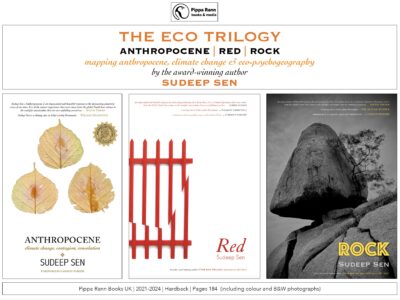It is December in Hyderabad. The air conditioner is set at 20 Degrees. Our days break between temperatures; between heat and chill; sweat and shiver. We ignore the everyday consequences of climate change and carry on with our lives. People wait for magnificent calamities. Poets don’t.
On 19th of December, 2022, internationally acclaimed poet, editor, artist Sudeep Sen’s multi-genre book, Anthropocene, Pippa Rann Books, UK won the Rabindranath Tagore Literary Prize, 2022. The book, a collection of poetry, prose, creative non-fiction and photography juxtaposes the sciences and the arts to tackle urgent issues of climate change and the pandemic. Sen’s philosophy seems to be inspired by the intricate relationship between purusha and prakriti. His works are lyrical, meditative, poignantly sharp testimonies to the capitalist ruin of the planet. A well-known contemporary Indian poet, Sen enunciates with profundity, the mass disappearance of biological and cultural diversity both at micro and macro levels*.
Anthropocene (Pippa Rann UK), is also nominated for multiple other international awards. Sudeep Sen was on shortlist for EroText (Vintage: Penguin Random House) last time in 2020 with the likes of Amitav Ghosh, Ranjit Hoskote and Raj Kamal Jha (who won it in). This year there were Anuradha Roy, Arundhati Subramaniam and others.

Sudeep Sen – Indian Poet with Global Conscious
Sudeep Sen is an international poet, his prize-winning books are: Postmarked India: New & Selected Poems (HarperCollins), Rain, Aria (A. K. Ramanujan Translation Award), Fractals: New & Selected Poems | Translations 1980-2015 (London Magazine Editions), EroText (Vintage: Penguin Random House), Kaifi Azmi: Poems | Nazms (Bloomsbury), and Anthropocene (Pippa Rann). He has edited influential anthologies, including The Harper Collins Book of English Poetry, World English Poetry, Modern English Poetry by Younger Indians (Sahitya Akademi), and Contemporary English Poetry by Indians. Blue Nude: Ekphrasis & New Poems (Jorge Zalamea International Poetry Prize) and The Whispering Anklets are forthcoming. Sen’s works have been translated into over twenty-five languages. He is the editorial director of AARK ARTS, the editor of Atlas, and the inaugural artist-in-residence at the Museo Camera. Sen is the first Asian to deliver the Derek Walcott Lecture and read at the Nobel Laureate Festival.
The Rabindranath Tagore Literary Prize is a literary honour in India conferred annually to published works of Indian authors (residing in India or abroad) in novels, short stories, poetry, and drama, originally written in any of Indian official languages and dialects, but translated to English (Murtaza Ali Khan).
This year The Rabindranath Tagore Literary Prize 2021-22 was also awarded to Shobhana Kumar for her book ‘A Sky Full of Bucket Lists,’ Red River. Mr Sanjoy K. Roy Managing Director, Teamwork Arts won the Tagore Prize for Social Achievement, 2021-2022. Each of the winners were presented with a Rabindranath Tagore statuette (the prize also includes a monetary award of 5000 US dollars) during a ceremony hosted by anchor and journalist Jujhar Singh at the India International Centre. The awards ceremony was attended by Freddy Svane, Ambassador of Denmark, Mumin Chen, Deputy Ambassador of Taiwan, the renowned doctor of the stars, Dr. George Gauthier II, Simona Ivanda, President of Tagore Literary Prize, Pawan Pahwa, Project Coordinator, Tagore Literary Prize, noted Indian poet Ashok Vajpeyi, Tagore scholar and researcher Prof. Ganguly, author, presenter, and podcaster Meenu Agrawal, and the award-winning Indian filmmaker Suraj Kumar, among others*.


FridayWall is delighted to present a conversation between Sudeep Sen and poet, professor Jhilam Chattaraj.
JC: Congratulations! You just You just won the ‘2021-22 Rabindranath Tagore Literary Prize Award’ for Anthropocene. What does this award personally mean to you?
SS: Awards are a lottery, but to be shortlisted along with writers I admire is more meaningful, winning it is a bonus. I would have been happy if any of the above writers won it. On a personal level, I am glad more people will be aware of my book on climate change and the pandemic; very urgent issues of our current times that need acute and immediate attention.
JC: In many ways, I see you connecting with global readers and people-at-large, like Tagore. Are you inspired by Tagore’s idea of ‘Cosmopolitan Modernity’?
SS: As a Bengali, how can Tagore not influence you? However, for me, his influence was oblique and subtle. The idea of ‘cosmopolitan modernity’ as I see it, was common to many Bengal thinkers, such as Ram Mohan Roy, Vivekananda, Ashapurna Devi, Netaji Bose, Mujibur Rahman, Satyajit Ray, Amartya Sen, Aparna Sen, and so many others.
JC: Converse: Contemporary English Poetry by Indians (Pippa Rann UK) is a huge success and acts as a “definitive” showcase. Could you share your experience as its editor?
SS: It was intense and energizing; over 15,000 pages of poetry was submitted. The 600+ page Converse features the best and most exciting ‘living’ poets from India and the Indian diaspora who write in English.
JC: Professor Rama Nair from Osmania University, Hyderabad recently published the book Sudeep Sen: A Critical Study. Could you tell us a little about it?
SS: Dr Nair has wonderfully put this academic and critical, 350+ page book together. It closely interrogates and critiques my body of work and my creative-critical practice over the last 35 years. It will be valuable for researchers and academics, as well as lay readers who are interested in poetry, literature and its processes.
JC: What drives you to write?
SS: Poetry does — it is unexplainable at a logical level. Words — its patterning and music, its architecture and magic — are an endless source of magic for me. Poetry is a lifelong quest!
JC: Do you think poetry can repair our relationship with technology and language?
SS: Yes, we can. Poetry is also about communication and healing; they are part of the architectural DNA of poetry. We string words together like a suture, and in this process, there is pain and pleasure. But ultimately you make beautiful art which is organic, which can repair a person’s relationship with language and humanity.
* Tagore literary prize given to honour published works of Indian authors – The Sunday Guardian Live
* Review: Anthropocene: Climate, Change, Contagion, Consolation by Sudeep Sen – Hindustan Times















